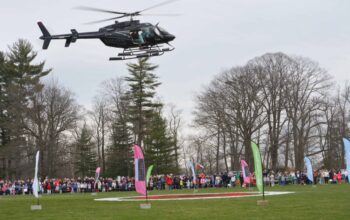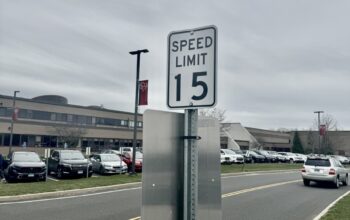Cat Levine, News Editor
@catcourant

Tuesday May 24, sophomores were excused from their classrooms and went into the history hallway to participate in the annual Sophomore Simulation. The Model UN Club hosted a day for the sophomores to take on the role of a member of the United Nations and work collaboratively to solve world issues. The Sophomore Simulation is a way for the MUN club to show other students in the school what Model UN is, how it runs and if it’s the right fit for them by mimicking a typical conference.
According to the co-captain of Model UN, senior Taylor Cowser, the club changed the structure of the simulation this year. “We tried a Joint Crisis Committee where two rooms were working on opposing sides of the space race,” she said. “These rooms have a lot going on and are sometimes hard to run, but we have a great staff this year that ran this JCC really well.”

A member of the Model UN and chair of DISEC, junior Julia Means, was also in charge of the simulation’s charity outreach program raising money for UNICEF. “We sponsored the non profit, United Nations Children’s Emergency Fund by selling baked goods and cookiegrams that could be read out loud to the committee,” Julia said.

As a participant of the simulation for four years, Taylor feels that it is a positive experience for all those involved. “The sophomore students learn a lot and really enjoy the day, and our club members love running it,” she said. “Our juniors in particular are tasked with coming up with the committee rooms and their topics, and put a lot of time into making the entire thing possible. The simulation is always successful in bringing in new members who typically then finish out their high school career in the club.”
Julia hopes that the sophomores left with new skill sets from the simulation. “The skills that we would ideally want a sophomore to retain from this would be how to debate, present their ideas in a formal resolution, and above all, collaborate with your peers to form unique ideas to solve global issues,” she said.
A member of the club and chair of the Meiji room, junior Jack Dahill, learned new skills that still influence him after being in the simulation. “I was definitely better at communicating my ideas to others, making others see my point of view, networking, and making connections with others,” he said.

After both participating in and running the simulation, Julia recommends that the upcoming sophomores put in the effort beforehand to make the simulation easier and more informative. “It is important to do research. This is not something you can fake your way through, and doing a position paper is the best way to put your research into ideas,” she said. “It is also important to speak- I know it can be daunting at first, but once you get through that, everything else will fall into place and seem easy.”
As someone who joined Model UN after the simulation, Jack Dahill encourages all sophomores to consider becoming involved with the club. “If you enjoyed the Sophomore Simulation, you should definitely join Model UN. It is a very small commitment, the meetings are once a week for 15 minutes, and you don’t have to be an award-winning ‘MUNer’ to have fun,” he said.



